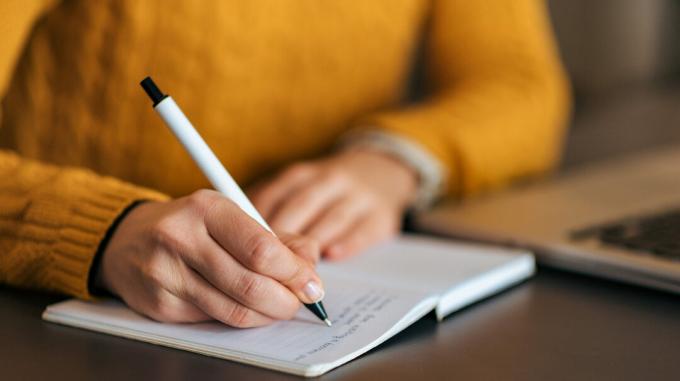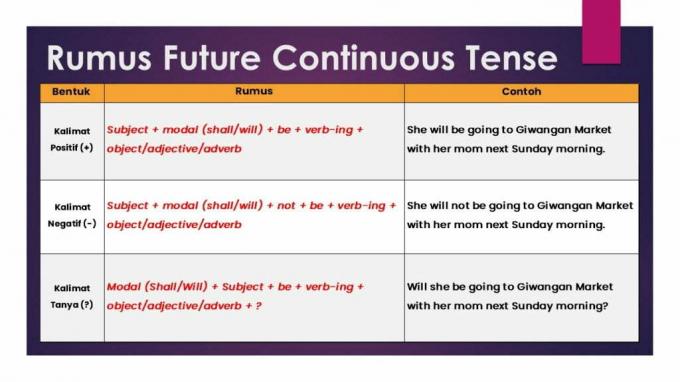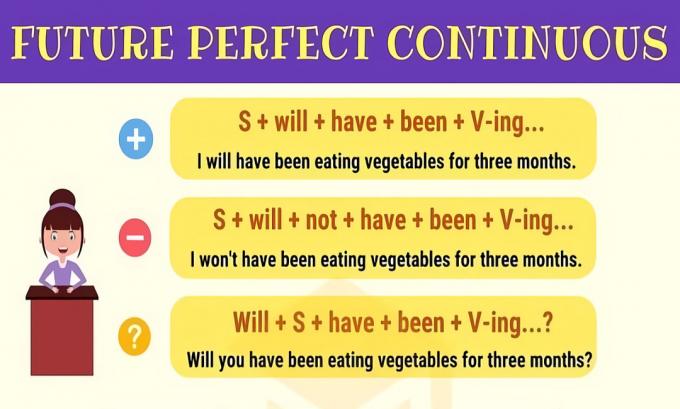Future Continuous Tense: Functions, Formulas, Example Sentences
Loading...
Future Continuous Tense is known as a tense that talks about an action that is taking place in the future. The word 'continuous' in it emphasizes that the activity or activity is ongoing for a certain period of time.
Not only that, this tense is also used when there are two events in the present and the future that take place in one sentence. How do you understand this condition? If you are confused, please refer to the presentation of this tense material in the following article.
List of contents
Definition of Future Continuous Tense

This tense is a branch of the continuous tense, which is basically a combination of the simple future tense and the simple continuous tense. So, this tense can be interpreted as a verb to express an event that is taking place in the future with a specific time description.
Read: Understanding Grammar
Future Continuous Tense Function

The following is a function of the tense entitled 'future continuous'.
1. To Express Activities That Will Be or Are Being Done in the Future at a Certain Time
For this function, the future continuous is used to express an activity that will be carried out or is being carried out at a specific time in the future. In showing the time, you must add the adverb of time as a complement.
For example, like the following sentences.
- My friend will be coming to my house at six o'clock tomorrow morning. (My friend is coming to my house at eight o'clock tomorrow morning.)
- I will be taking a holiday next month. (I'll be taking a vacation next month.)
2. Declare an Event that is currently Occurring in the Future When Another Event is also Occurring in the Future
This tense can be used to explain that there is a long action in the future followed by a shorter action in the future. These additions can be real or just a matter of time.
For example, like the following sentences.
- She will be walking through this way when he sees something interesting. (He would walk down this street if he saw anything interesting.
- She will be looking at you when you call her. (He will look at you when you call him.)
3. Formal and Polite Asking a Question to Get Information or Someone's Intentions by Not Affecting Plans
If you find examples of future continuous tense questions in this function, it is used to find out about the intentions or plans that someone will carry out. Generally, this question is asked without the intention of making any impact.
For example, like the following sentences.
- Will Boni be coming back? (Will Boni come back?)
- Will Zea be playing a game with Hana tonight? (Will Zea play games with Hana tonight?)
4. Statements of Predictions or Presumptions Regarding Future Events
Advertisement
This tense is also commonly used in guessing or guessing about activities that will occur in the future. For example, like the following sentences.
- Be quiet, the students will be taking exams today! (Don't make a fuss, the students will have an exam today!)
- She studies everyday, she will be winning the Math competition next month. (He studies every day, he will win Maths competition next month.)
5. Schedule Setting
Future continuous tense is tense that is used to discuss the preparation or arrangement of a schedule with the same method as you would use the present continuous. For example in the sentence: They'll be studying at eight o'clock. (They will study at eight.)
The sentence uses this tense to convey that 'they' have scheduled to study at a predetermined time in the future. The sentence can also use the present continuous, becomes: They are studying at eight o'clock. (They study at eight.)
6. Emphasize On Current Events Expected to Happen in the Future
This tense can be used to indicate an ongoing activity, but you can also expect that activity to occur in the future as well. For example, like the following sentences.
- Hyona will be visiting library with Xia next week. (Hyona will visit the library with Xia next week.)
- When Etna is at her home, she will be working in her bedroom. (When Etna is at home, she will work in her bedroom.
7. Emphasizing what is currently happening and is likely to continue in the future
The future continuous function here is not much different from the predict function, but the activity referred to is what is happening right now, or expects it to happen in the future. In addition, the word 'still' is commonly added after 'subject'.
For example, like the following sentences.
- In two hour, I'll still be watching a movie at cinema. (In two hours, I'll still be watching a movie in theaters.)
- Tomorrow, she'll still be waiting for the recruitment progress. (Tomorrow, he will still be waiting for the recruitment process.)
Read: Procedure text
Future Continuous Tense Formula

You can recall the formulas of the simple future tense and simple continuous tense, then combine them with some additional components.
1. Sentence Pattern
To be more complete, the following is the formula for this tense.
- Positive (+): Subject + will/shall + be + verb-ing + complement.
- Negative (-): Subject + will/shall + not + be verb-ing + complement.
- Tanya (?): Will/Shall + be + verb-ing + complement.
2. Adverb of Time in Future Continuous Tense
In the use of this tense, there are several adverbs of time that you can use to tell a specific time in the future. These descriptions include the following.
- At this time next month. (At this time next month.)
- At seven o'clock tomorrow morning. (At seven o'clock tomorrow morning.)
- At this time tomorrow. (At this time tomorrow.)
- Tonight at ten o'clock. (Tonight at ten.)
- Next year on September. (Next year in September.)
3. Verbs in Future Continuous
Based on the existing formula, it can be seen that the verbs used in this tense are action verbs, or dynamic verbs, or verbs ending in -ing, such as talking, walking, swimming, writing, running, and etc.
Read: Narrative text
Example Sentences of Future Continuous Tense

To increase your understanding, consider some of the uses of this tense in the examples below.
1. Examples of Positive Sentences
Some examples of positive sentences can be seen as follows.
- Tika will be attending school this Monday morning. (Tika will attend school this Monday morning.)
- They will be playing tennis at 5 PM this afternoon. (They will be playing tennis at 5 this afternoon.)
2. Examples of Negative Sentences
Examples of negative sentences can be seen in the points below.
- He won't be doing his homework at this time tomorrow. (He won't be doing his homework at this hour tomorrow.)
- Harun will not be sleeping for twelve hours. (Aaron will not sleep for twelve hours.)
3. Question Sentence Example
While examples of interrogative sentences can be seen in the following sentences.
- Will she be cleaning this room properly? (Will he clean this room properly?)
- Will we be buying many snacks tomorrow night? (Are we going to buy a lot of snacks tomorrow night?)
How? Can you understand the meaning of the Future Continuous Tense and its functions and uses in the current sentence? The point is in the word 'future' or the future, and 'continuous' or ongoing. Don't forget to practice so that your abilities are more complete!
ADVERTISEMENT
X CLOSE
